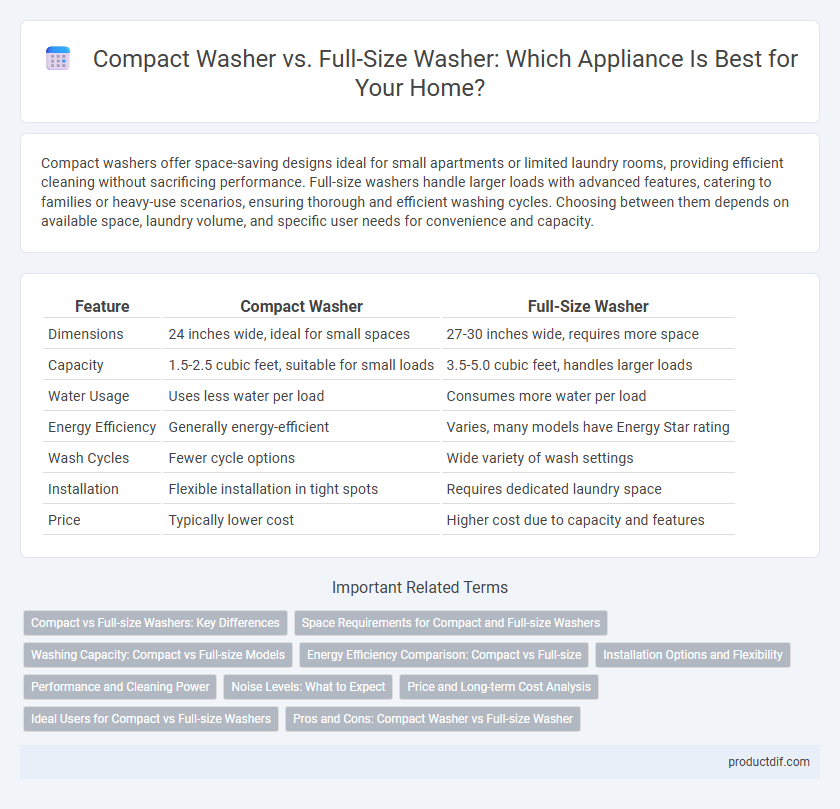Compact washers offer space-saving designs ideal for small apartments or limited laundry rooms, providing efficient cleaning without sacrificing performance. Full-size washers handle larger loads with advanced features, catering to families or heavy-use scenarios, ensuring thorough and efficient washing cycles. Choosing between them depends on available space, laundry volume, and specific user needs for convenience and capacity.
Table of Comparison
| Feature | Compact Washer | Full-Size Washer |
|---|---|---|
| Dimensions | 24 inches wide, ideal for small spaces | 27-30 inches wide, requires more space |
| Capacity | 1.5-2.5 cubic feet, suitable for small loads | 3.5-5.0 cubic feet, handles larger loads |
| Water Usage | Uses less water per load | Consumes more water per load |
| Energy Efficiency | Generally energy-efficient | Varies, many models have Energy Star rating |
| Wash Cycles | Fewer cycle options | Wide variety of wash settings |
| Installation | Flexible installation in tight spots | Requires dedicated laundry space |
| Price | Typically lower cost | Higher cost due to capacity and features |
Compact vs Full-size Washers: Key Differences
Compact washers offer space-saving dimensions ideal for small apartments, featuring capacities typically between 1.5 to 2.3 cubic feet, while full-size washers generally provide 3.5 to 5.0 cubic feet of load capacity suited for larger households. Energy consumption in compact washers tends to be lower, but full-size washers often deliver faster cycle times and advanced washing options like steam cleaning and smart connectivity. Installation flexibility varies, with compact washers often stackable or suitable for countertop placement, contrasting with full-size models that require dedicated laundry room space.
Space Requirements for Compact and Full-size Washers
Compact washers require significantly less space, typically measuring around 24 inches in width and depth, making them ideal for small apartments or tight laundry rooms. Full-size washers usually need at least 27 to 30 inches in width and more clearance for door swings and connections, demanding a dedicated laundry area or larger utility space. Choosing between the two depends largely on available floor space and installation constraints in your home.
Washing Capacity: Compact vs Full-size Models
Compact washers generally offer a washing capacity between 1.5 to 2.5 cubic feet, ideal for small loads and limited spaces, while full-size washers provide capacities ranging from 3.5 to 5.0 cubic feet, accommodating larger loads and bulky items. The smaller drum of compact models reduces water and energy consumption per load but may require more frequent cycles for bigger households. Full-size washers optimize efficiency for heavier laundry demands with advanced wash cycles and higher spin speeds for better water extraction.
Energy Efficiency Comparison: Compact vs Full-size
Compact washers typically consume less water and energy due to their smaller capacity, making them ideal for small households or limited spaces. Full-size washers, while using more water per cycle, often feature advanced energy-saving technologies such as high-efficiency motors and optimized wash cycles that reduce overall energy consumption for larger loads. Energy Star ratings highlight that selecting the appropriate washer size based on laundry volume significantly impacts both electricity usage and utility costs over time.
Installation Options and Flexibility
Compact washers offer versatile installation options, fitting easily into small spaces such as closets, under countertops, or in apartments with limited room, making them ideal for urban living. Full-size washers require dedicated laundry areas with standard hookups, offering less flexibility but higher capacity for larger households. Selecting between these options depends on available space and laundry needs, with compact washers maximizing installation flexibility in tight environments.
Performance and Cleaning Power
Compact washers offer efficient performance with quick wash cycles designed for smaller loads, making them ideal for limited spaces and light to moderate cleaning needs. Full-size washers provide superior cleaning power with larger capacity drums and advanced agitation technology, handling heavy-duty stains and bulky items more effectively. Performance-wise, full-size models excel in thoroughness and versatility, while compact washers prioritize space-saving efficiency and energy use.
Noise Levels: What to Expect
Compact washers typically produce less noise due to smaller motors and reduced water capacity, making them ideal for apartments or shared living spaces where quiet operation is essential. Full-size washers, although louder because of their larger drums and more powerful motors, often incorporate advanced noise-reduction technologies such as insulated cabinets and vibration control systems to minimize sound during high-speed spin cycles. When choosing between the two, consider the noise level specifications measured in decibels (dB), with compact models averaging 50-60 dB and full-size units ranging from 60-70 dB under normal operation.
Price and Long-term Cost Analysis
Compact washers typically range from $500 to $1,000, while full-size washers cost between $700 and $1,500, offering more capacity at a higher upfront price. Long-term cost analysis reveals that compact washers consume less water and energy, potentially lowering utility bills over time, but may require more frequent washing cycles due to smaller loads. Full-size washers, although more expensive initially, often deliver better energy efficiency per load and durability, resulting in lower maintenance costs and greater value for large households.
Ideal Users for Compact vs Full-size Washers
Compact washers suit individuals with limited space, such as apartment dwellers or small households, offering efficient washing in a smaller footprint. Full-size washers cater to larger families or those with heavy laundry needs, providing greater capacity and more robust cleaning cycles. Users prioritizing speed and space-saving features benefit from compact models, while those requiring thorough washing and larger loads prefer full-size washers.
Pros and Cons: Compact Washer vs Full-size Washer
Compact washers offer space-saving benefits ideal for small apartments but generally have lower load capacities and longer wash cycles compared to full-size washers. Full-size washers handle larger laundry loads efficiently and often include more advanced features, though they require more space and typically consume more water and energy. Choosing between the two depends on balancing space constraints against washing capacity and efficiency needs.
Compact Washer vs Full-size Washer Infographic

 productdif.com
productdif.com